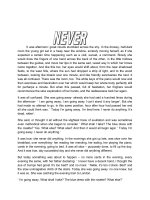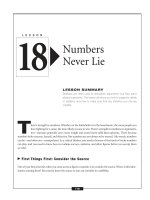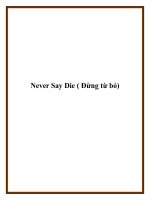Never
Bạn đang xem bản rút gọn của tài liệu. Xem và tải ngay bản đầy đủ của tài liệu tại đây (35.87 KB, 4 trang )
It was afternoon: great clouds stumbled across the shy. In the drowsy, half-dark
room the young girl sat in a heap near the window, scrarely moving herself, as if she
expected a certain time happening such as a visit, sunset, a command. Slowly she
would draw the fingers of one hand across the back of the other, in the little hollows
between the guides, and move her lips in the same sad, vexed way in which her brows
came together. And like this too, her eyes would shift about, from the near shadowed
fields, to the wast hills, where the sun had dropped a strip of light, and to the wood
between, looking like bloack scar one minute, and like friendly sanctuaries the next. It
was all confused. There was the room, too. The white keys of the piano would now and
then exercises and fascination over her which would keep her whole body perfectly still
for perharps a minute. But when this passed, full of hesitation, her finghers would
recommence the slow exploration of her hands, and the restlessness took her again.
It was all confused. She was going away- already she had said a hundred times during
the afternoon- ‘ I am going away, I am going away I can’t stand it any longer’. But she
had made no attempt to go. In this same position, hour after hour had passed her and
all she could think was. ‘ Today I’m going away. I’m tired here. I never do anything. It’s
dead, rotten’.
She said, or thought it all without the slightest trace of exultation and was sometimes
even methodical when she began to consider ‘ What shall I take? The blue dress with
the rosette? Yes. What else? What else? And then it would all begin agai: ‘ Today I’m
going away. I never do anything.’
It was true: she never did anything. In the mornings she got up late, was slow over her
breakfast, over everything- her reading her mending, her eating, her playing the piano,
cards in the everning, going to bed. It was all slow – purposely done, to fill up the day.
And it was true, day succeeded day and she never did anything different.
But today something was about to happen – no more cards in the evening, every
evening the same, with her father declaring: ‘ I never have a decent hand, I thought the
ace of trumps had gone! It’s too bad!!’ and no more: ‘ Nellie, it’s ten o’clock- Bed!’ and
the slow unimagiative climb of the stairs. Today she was going away: no one knew, but
it was so. She was catching the evening train to London.
‘ I’m going away. What shall I take? The blue dress with the rosette? What else?’
She crept upstairs with difficulty, her body stiff after sitting. The years she must have sat
figuratively speaking, and grown stiff! And as if in order to secure some violent reaction
against it all she threw hearself into the packing of the things with a nervous vigour,
throwing in the blue dress first and after it a score of things she hade just remembered.
She fastend her bag: it was not heavy. She counted her money a dozen times. It was all
right! It was all right! It was all right! She was going away!
She descended into the now dark room for the last time. In the dining room someone
was rattling tea-cups, an unbearable, horribly domestic sound! She wasn’t hungry: she
would be in London by eight – eating now meant making her sick. It was easy to wait.
The train went at 6.18. She looked it up again: ‘ Elden 6.13, Olde 6.18, London 7.53’
She began to play a waltz. It was slow, dreamy tune, ta-tum, tum, ta-tum, tum, ta-tum,
tum, of which the notes slipped out in mournful, sentimental succession. The room was
quite dark, she could scarcely see the keys, and into the tune itself kept stimulating
‘Elden 6.13, Olde 6.18’, impossible to mistake or forget.
As she played on she thought: ‘TV never play this waltz again. It has the atmosphere of
this room. It’s the last time!’ The waltz slid dreamily to an end: for a minute she sat in
utter silence, the room dark and mysterious, the air of the waltz quite dead, then the
teacups rattled again and the thought came back to her:’ I’m going away!’
She rose and went out quietly: The grass on the roadside moved under the evening
wind, sounding like many pairs of hands rubbed softly together. But there was no other
sound, her feet were light, no one heard her, and as she went down the road she told
herself: ‘It’s going to happen! It’s come at last’.
‘ Elden 6.13, Olde 6.18’
Should she go to Elden or Olde? At the crossroads she stood to consider, thinking that
if she went to Elden no one would know her. But at Olde someone would doubtless
notice her and prattle about it. To Elden, then not that it mattered. Nothing mattered
now. She was going, was as good as gone!
Her breast, tremulously warm, began to rise and fall as her excitement increased. She
tried to run over the things in her bag and could remember only ‘the blue dress with the
rosette’, which she had thrown in first and had since covered over. But it didn’t matter.
Her money was safe, everything was safe, and with that thought she dropped into a
strange quietness, deepening as she went on, in which she had a hundred emotions
and convictions. She was never going to strum that waltz again, she had played cards
for the last, horrible time, the loneliness, the slowness, the oppression were ended, all
ended.
‘I’m going away!’
She felt warm; her body tingled with a light delicious thrill that was like the caress of a
soft night-wind. There were no fears now. A certain indignation, approaching fury even,
sprang up instead, as she thought: ‘No one will believe I’ve gone. But it’s true – I’m
going at last’
Her bag grew heavy. Setting it down in the grass she sat on it for a brief while, in
something like her attitude in the dark room during the afternoon, and indeed actually
began to rub her gloved fingers over the backs of her hands, a phrase of two of the
waltz came back to her…. That silly piano! Its bottom G was flat, had always been flat!
How ridiculous! She tried to conjure up some sort of vision of London, but it was difficult
and in the end she gave way again to the old cry: ‘I’m going away’. And she was
pleased more than ever deeply.
On the station a single lamp burned radiation a fitfull yellowness that only increased the
gloom. And worse, she saw no one and in the cold emptiness traced and retraced her
footsteps without the friendly assurance of another sound. In the black distance all the
signals showed hard circles of red, looking as if they could never change. But she
nevertheless told herself over and over again: ‘I’m going away – I’m going away’. And
later: I hate everyone. I’ve changed until I hardly know myself’.
Impatiently she looked for the train. It was strange. For the first time it occurred to her to
know the time and she pulled back the sleeve of her coat. Nearly six-thirty! She felt cold.
Up the line every signal displayed its red ring, mocking her. ‘Six –thirty, of course, of
course’. She tried to be careless. ‘Of course, it’s late, the train is late, but the coldness,
in reality her fear, increased rapidly, until she could no longer believe those words…
Great clouds, lower and more than ever depressing, floated above her head as she
walked back. The wind had a deep note that was sad too. These things had not troubled
her before, now they, also, spoke failure and foretold misery and dejection. She had no
spirit, it was cold, and she was too tired even to shudder.
In the absolutely dark, drowsy room she sat down, telling herself: ‘This isn’t the only
day. Some day I shall go. Some day’.
She was silent. In the next room they were playing cards and her father suddenly
moaned: ‘ I thought the ace had gone’. Somebody laughed. Her father’s voice came
again: ‘ I never have a decent hand’ I never have a decent hand! Never!’
It was too horrible! She couldn’t stand it! She must do something to stop it! It was too
much. She began to play the waltz again and the dreamy, sentimental arrangement
made her cry.
‘This isn’t the only day’, she reassured herself ‘I shall go some day.’
And again and again she played the waltz, … her head and cried, ‘ Some day! Some
day!’









